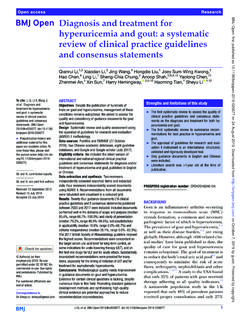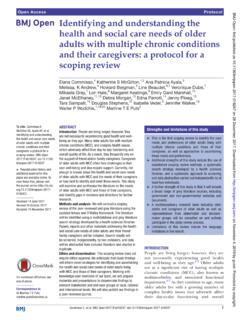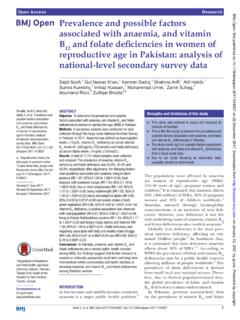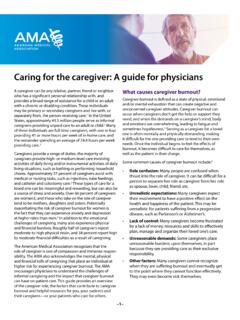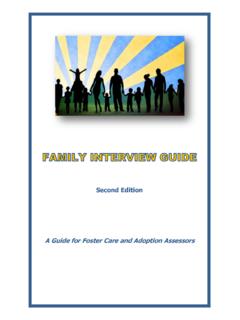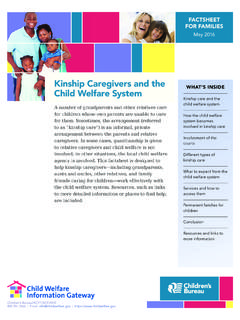Transcription of APPENDIX A: SEMI-STRUCTURED INTERVIEW GUIDE …
1 APPENDIX A: SEMI-STRUCTURED INTERVIEW GUIDE . PATIENTS. Introduction Thank you for agreeing to participate in this INTERVIEW . We are interviewing you to better understand what patients and their caregivers think about [name of intervention] and how we can improve the way we provide care for people with chronic disease. So there are no right or wrong answers to any of our questions, we are interested in your own experiences. Participation in this study is voluntary and your decision to participate, or not participate, will not affect the care you currently receive from [name of intervention]. The INTERVIEW should take approximately one hour depending on how much information you would like to share. With your permission, I would like to audio record the INTERVIEW because I don't want to miss any of your comments. All responses will be kept confidential.
2 This means that your de-identified INTERVIEW responses will only be shared with research team members and we will ensure that any information we include in our report does not identify you as the respondent. You may decline to answer any question or stop the INTERVIEW at any time and for any reason. Are there any questions about what I have just explained? May I turn on the digital recorder? _____. Please note that this GUIDE only represents the main themes to be discussed with the participants and as such does not include the various prompts that may also be used (examples given for each question). Non-leading and general prompts will also be used, such as Can you please tell me a little bit more about that? and What does that look like for you . Establishing Rapport Before we begin, it would be nice if you could tell me a little bit about yourself.
3 Tailor a question here to specific person and/or situation. For example: This is a nice neighborhood, how long have you been living here? . 1. Previous Health Experiences Can you tell me about your understanding of your health condition before you visited/ enrolled in [name of intervention]? Prompts: What were you doing to manage your care? Who did you turn to for help/advice (clinician, family member, friend, etc.)? Have there been any changes in the way you now understand your condition? Prompts: Were you provided any resources that assisted you in understanding your condition? ( pamphlets, pictures, etc.)? If so, how useful or not useful were they in helping you understand your condition? 1. July 10th 2012. APPENDIX A: SEMI-STRUCTURED INTERVIEW GUIDE . Prompts: What were you particular concerns about your health (ie managing pain, employment issues, sadness/depression, ability to participate in social life, ability to participate in personal relationships, etc.)
4 ? 2. Patient Experiences of new care model How did you first get connected with [name of intervention]? Were you referred? By whom? How many times have you seen the care team? Prompts: Let's talk about your first visit. What stands out for you about that experience? (Was a friend or family member with you? How would you describe the communication you had with the program team? How would you describe your level of participation in any decisions affecting your health)? Was there anything you particularly liked about receiving care from [name of intervention]? Prompts: For example, was it the team that provided care for you? Was it the quality of care you received? Was it the ability to access care? Was there anything you didn't like about [name of intervention]? Prompts: For example, was it the ability to access care? Did you have any other concerns in your life that the program did not address (family relationship issues, caretaking responsibilities for another, financial worries, etc.)
5 ? Did you discuss these concerns with the [name of intervention] team? Why/why not? Was there someone else you discussed them with? 3. Changes in patient-reported health status/ outcomes/behaviours post-program How would you describe your health since receiving care from [name of intervention]? Prompts: For example, has your health improved, declined or remained the same? Prompts: What are the reasons you think your health has improved, declined or remained the same? Thinking back to how you handled your care before enrolling [name of intervention], can you describe any situations where you would take different steps in managing your care now ( going to the emergency department)? Prompts: For example, if you were to suddenly feel unwell, who would you call? 4. Patient's experiences of integration of care across co-morbidities Can you tell me about any other programs that you are involved in to manage your health needs now?
6 Prompts: How long have you been involved with them? Has there ever been any confusion as to who you are supposed to contact? Or how you are to manage your care? 5. Conclusion My last two questions. Would you recommend this program to a patient with similar needs as you? Prompts: Can you explain why you would or would not recommend this program? Is there anything else that you would like to comment on about the [name of intervention] that we haven't discussed today? Thank you very much for your time and the information you shared today. 2. July 10th 2012. APPENDIX A: SEMI-STRUCTURED INTERVIEW GUIDE . caregivers . Introduction Thank you for agreeing to participate in the INTERVIEW . We are interviewing you to better understand what caregivers of our patients think about and how we can improve the way we provide care for people with chronic disease. So there are no right or wrong answers to any of our questions, we are interested in your own experiences.
7 Participation in this study is voluntary and your decision to participate, or not participate, will not affect the care your [mother/ father/ spouse/friend, etc.]** currently receives from [name of intervention].**. The INTERVIEW should take approximately one hour depending on how much information you would like to share. With your permission, I would like to audio record the INTERVIEW because I don't want to miss any of your comments. All responses will be kept confidential. This means that your INTERVIEW responses will only be shared with research team members and we will ensure that any information we include in our report does not identify you as the respondent. You may decline to answer any question or stop the INTERVIEW at any time and for any reason. May I turn on the digital recorder? Are there any questions about what I have just explained?
8 ** personalize and use throughout INTERVIEW . Be as conversational as possible, say your mom or your dad if that is the term participant uses to describe their relative . _____. Establishing Rapport It would be nice if you could tell me a little bit about yourself. Tailor a question here to specific person and/or situation. For example: This is a nice neighborhood, how long have you been living here? . 1. Previous Caregiving Experience I wanted to start asking you some questions now. How long have you been caring for [your relative ]? What has that been like for you? Can you tell me about [your relative 's] health condition before they enrolled in [name of intervention]? How has this changed over time? Prompts: For example, has your relative 's health improved, declined or remained the same? Can you provide an example of that. Prompts: What are the reasons you think your relative 's health has improved, declined or remained the same?
9 How would you describe your role in their care-taking prior to being involved in [name of intervention]? Prompts: How long have you been in this role? Does anyone else assist you with care-taking? Has your role changed at all over time? What were you looking to get out of the intervention program? In relation to your relative 's care? In relation to support for you? 3. July 10th 2012. APPENDIX A: SEMI-STRUCTURED INTERVIEW GUIDE . Experiences of new care model Do you recall how your relative got involved with [name of intervention]? Prompts: Were you there for the first visit? What happened during that first visit? If not there for first visit: When did you first attend a visit? What happened during that visit? Prompts: Were you or your [ relative ] provided any resources that assisted you in understanding their condition? ( pamphlets, pictures, etc.)?
10 If so, how useful or not useful were they in helping you understand their condition? Can you tell me about what you liked most about [name of intervention]? Prompts: For example, was it something about the people that cared for your relative ? Was it the quality of care your relative received? Was it the ability to access care? Can you tell me about what you didn't like about [name of intervention]? Prompts: For example, was it the people that cared for [your relative ]? Was it the quality of care [your relative ] received? Was it the ability to access care? What has been your role in the decision making of your relative 's healthcare plan? Prompts: How are you consulted about decisions affecting their care? How did you feel about that? Do you think you should be consulted more than you are now? How? since program Do you think [name of intervention] has changed how you manage your relative 's care?
